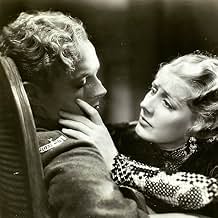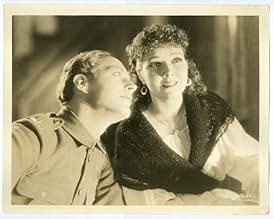अपनी भाषा में प्लॉट जोड़ेंShowgirl Sally meets young playboy Leonard St. John; they fall in love and are secretly married. When Leonard's father discovers this he sets out to break them apart, and following a bitter ... सभी पढ़ेंShowgirl Sally meets young playboy Leonard St. John; they fall in love and are secretly married. When Leonard's father discovers this he sets out to break them apart, and following a bitter row, Leonard kills himself, leaving Sally to pick up the pieces of her life.Showgirl Sally meets young playboy Leonard St. John; they fall in love and are secretly married. When Leonard's father discovers this he sets out to break them apart, and following a bitter row, Leonard kills himself, leaving Sally to pick up the pieces of her life.
- निर्देशक
- लेखक
- स्टार
- Undetermined Secondary Role
- (काटे गए सीन)
- British Soldier
- (बिना क्रेडिट के)
- Aubrey's Butler
- (बिना क्रेडिट के)
- Supper Club Guest
- (बिना क्रेडिट के)
- French Hotel Desk Clerk
- (बिना क्रेडिट के)
- Aubrey's Secretary
- (बिना क्रेडिट के)
- Marie - the French Nurse
- (बिना क्रेडिट के)
- Cafe Proprietress
- (बिना क्रेडिट के)
- Commanding Officer
- (बिना क्रेडिट के)
- Aubrey's Maid
- (बिना क्रेडिट के)
फ़ीचर्ड समीक्षाएं
Anyway, Holmes quickly justifies are suspicions. His father disinherits him, so angry is he that Holmes has married so far below his station. Holmes does nothing to make us feel any sympathy for him, but Irene Dunne loves him so! A real unappealingly weak character, he is.
The dialogue is so insipid and without drama in the first half of the film that I seriously wondered whether I had the will to see it through.
Happily, there is much improvement in the second half. Dunne's soldier-son, played by Douglas Walton, starts off as weak and selfish a person as his father (Holmes) was, but he does grow up and change nicely, and is somewhat appealing. Dunne is fabulous and convincing as an older woman - actually, impressively so - it is hard to recognize her as an attractive younger woman in her "old age" make-up!
Lionel Atwill is absolutely evil as Holmes' brutally heartless father. The best scene in the film actually occurs in the first half: look for the close-up, upper-bodies -only shot of Dunne and Holmes in what will be their final parting; the entire shot is beautifully and slightly and softly out of focus, and is quite effective and touching.
Overall, this is a mixed bag, but if you love early sound films just for their own sake, or are a fan of Irene Dunne, then you will appreciate this little soap opera.
An entire genre of motion pictures, which often feature Barbara Stanwyck or Lana Turner, has used this basic plot to wring tears from largely female audiences. In "The Secret of Madame Blanche," Irene Dunne takes a turn at this well-worn routine and maintains her dignity throughout, despite the script's attempts to drown her in clichés. In the role of showgirl, Sally Sanders, Dunne has a few opportunities to show off her fine voice, but the musical selections are poor. The relatively short film, which was adapted from a play, lurches forward from hackneyed scene to hackneyed scene and leaves chasms of time for the audience to fill in. Occasionally, patient viewers will be rewarded with dialog and delivery so rich in camp that they will howl helplessly with unintended laughter, although a mouth-to-mouth kiss between mother and son, perhaps common for the period, induces cringes today. While Lionel Atwill is effective as Aubrey St. John, the selfish controlling father, and Philips Holmes is appropriately weak as his son, the rich playboy, the film offers little beyond the incomparable Irene Dunne slumming in a sub-par vehicle. Coincidences abound, French accents come and go, laws benefit the rich and oppress the poor, and a mother's self-sacrificing love conquers all. What more could one ask for? Perhaps Barbara Stanwyck and "Stella Dallas?"
The actor who plays her son, many years later, is pallid and odd looking. And the screenwriters (and censors) seem to have forgotten who is related to whom and how at the climax.
Dunne is charming but she has a terribly corny plot to work with. She ages well. When she is an older woman, going under the name of the title, she is tougher than usual. Maybe Barbara Stanywck could have done more with this role. But it's pretty doubtful.
LIONEL ATWILL is the rich father whose son (PHILLIPS HOLMES) has fallen in love with a cabaret singer and he opposes the match from the start, threatening to stop giving his son handouts to keep them solvent. The son is destitute when he learns that she's about to have a baby and finally commits suicide. The years fly by and Dunne is now a working woman in London at a not very reputable establishment populated by servicemen. It's World War I and one of the patrons is a young man who makes a fuss over not being given a room. He turns out to be her son and she is soon protecting him from a murder charge.
It's a pretty plot-heavy melodrama with enough twists and turns to keep the viewer interested, but you have to have a taste for these mother/son tear-jerkers to truly enjoy this sort of film.
The final scene with mother and son reunited at a prison after a stormy trial, is reminiscent of MADAME X--but at least here, the son learns the true identity of his mother.
क्या आपको पता है
- ट्रिवियाThe play originally opened in New York City, New York, USA on 4 December 1923 and ran for 85 performances.
- कनेक्शनEdited from The Big Parade (1925)
- साउंडट्रैकIf Love Were All
(1924) (uncredited)
Music by William Axt
Lyrics by Martha Lois Wells
Sung by Irene Dunne in a show
टॉप पसंद
विवरण
- रिलीज़ की तारीख़
- कंट्री ऑफ़ ओरिजिन
- भाषा
- इस रूप में भी जाना जाता है
- The Lady
- फ़िल्माने की जगहें
- उत्पादन कंपनी
- IMDbPro पर और कंपनी क्रेडिट देखें
- चलने की अवधि1 घंटा 24 मिनट
- रंग
- पक्ष अनुपात
- 1.37 : 1
इस पेज में योगदान दें






































